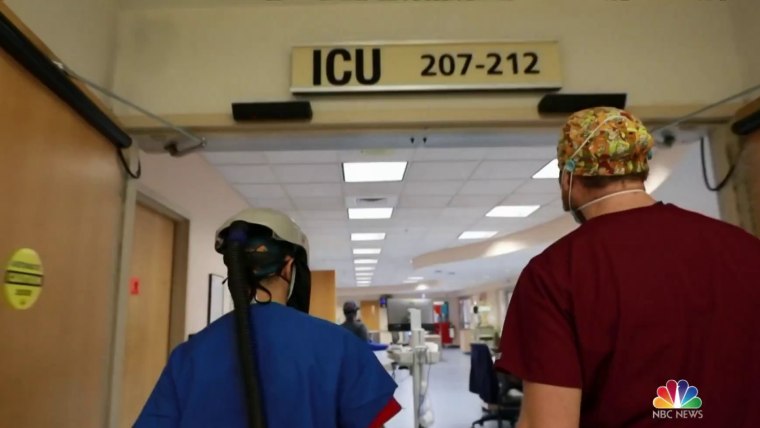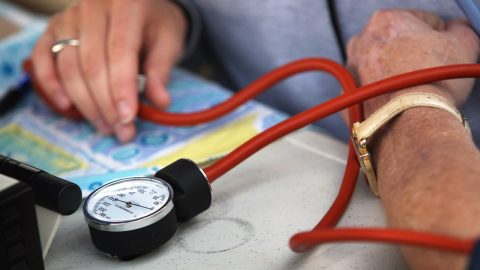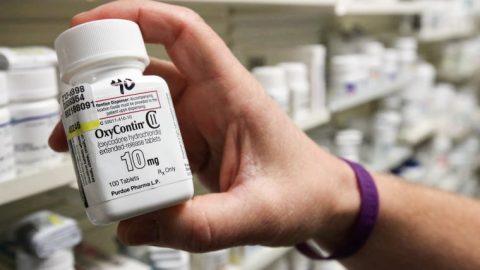As the super contagious omicron variant of the coronavirus spreads, hospitals are seeing a growing trend — patients admitted for other ailments are also testing positive for Covid-19. Doctors say it may mean more people have asymptomatic or undiagnosed disease than the current data show.
Across New York-Presbyterian’s 10 campuses, just less than half of patients are admitted with Covid, meaning they were hospitalized for a non-Covid related issue but were also tested and found to be carrying the virus. Statewide the figure is 43 percent, according to state data.
“I’ve admitted patients with abdominal pain, I’ve admitted patients with chest pain who had no symptoms of respiratory illness, cough or Covid, and they just ended up being Covid positive,” said Dr. Rahul Sharma, the emergency physician-in-chief for the NewYork-Presbyterian/Weill Cornell Medical Center.
Hospitals across the country are also seeing a greater proportion of these so-called incidental Covid cases amid the omicron surge.
In Austin, Texas, some local hospitals report that 30 percent to 40 percent of the patients admitted for other reasons are also Covid positive, Dr. Desmar Walkes, medical director/health authority for the city of Austin and Travis County, said a news call Thursday.
For full coverage of the coronavirus pandemic
Dr. Ryan Maves, an infectious disease and critical care physician at the Wake Forest School of Medicine in North Carolina, said he is also seeing more of these cases than usual, although he added most are mild or asymptomatic.
Health experts say the emerging trend of patients admitted to the hospital with Covid — instead of for Covid — may actually be a good sign, as it supports growing evidence that omicron, already the dominant strain in the United States, is less likely to cause severe illness than earlier variants were, especially in people who are fully vaccinated and boosted.
But it also complicates how one views a Covid hospitalization in the U.S., they said. Similar to previous Covid waves, patients infected with the virus are quickly filling up hospitals beds, overwhelming hospital staff and delaying elective procedures, but not as many of them will suffer from struggling to breathe and needing supplemental oxygen, among other conditions.
Hospitalizations may become a less reliable gauge of the pandemic’s toll going forward, experts say.
“I still think hospitalization data is the best data we have,” said Dr. Stephen Schrantz, an infectious disease expert at UChicago Medicine, “but it is probably only useful as a relative value, meaning Covid is up or down, and not accurate as far as actual cases.”
Covid could worsen underlying illnesses
Dr. Jeremy Faust, an emergency physician at Brigham and Women’s Hospital, said hospital staff shouldn’t “downplay” patients admitted with Covid because they are often earlier in the course of their disease and may be far more contagious to others, including to at-risk patients and health care workers.
Doctors also still must be careful not to dismiss patients who test positive for Covid but are not presenting the more obvious symptoms because the virus could be exacerbating an underlying medical condition, said Dr. Isaac Bogoch, an infectious disease specialist at the University of Toronto.
Maves of Wake Forest School of Medicine said physicians often start patients who tested positive for Covid on a round of the antiviral drug remdesivir — in addition to care for other ailments — if they have a comorbidity that puts them at greater risk of developing severe disease.
Other effective treatments, like monoclonal antibodies or oral antiviral drugs, from Pfizer and Merck, are currently in short supply.
Testing positive for Covid can also delay care for other conditions, doctors say.
“There a lot of patients who have some sort of chronic disease, whether it’s mental health issues, depression, addiction, they’re on dialysis, and so they rely on services that are outside the hospital to take care of them,” said Mucio Kit Delgado, an ER doctor at Penn Presbyterian Medical Center emergency department in Philadelphia. But if they test positive, “the amount of places becomes very limited to where they can go. And so then, they just get stuck in your emergency department.”
Dr. Ali Raja, an emergency physician at Massachusetts General Hospital, said he has witnessed the same thing, specifically patients who need psychiatric care but can’t go to the psychiatric unit because they are positive for Covid.
“We have had kids wait four weeks for pediatric psychiatric beds,” he said, noting some of those children have to wait in the emergency department.
Follow NBC HEALTH on Twitter & Facebook.










Recent Comments